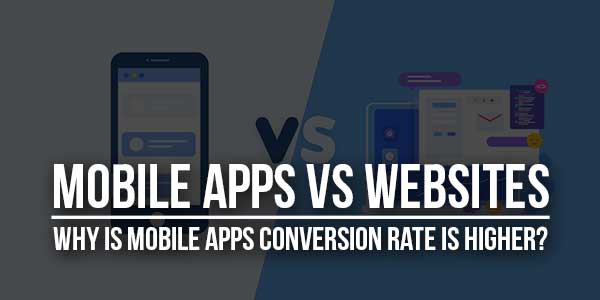
We’re living in a fast-paced digital world where websites and mobile apps play a vital role in creating a significant online presence for the business. Websites are the traditional way of building a brand presence that is now replaced with modern mobile apps. We might have heard that creating a mobile-friendly website can offer great benefits to mobile users. Agreed, right? But why do they don’t have a higher conversion rate as compared to mobile apps? Genuinely speaking, today everyone relies on their mobile phones to perform their work more quickly and smartly. And here comes the reason for creating a mobile app presence for your business.
Mobile apps are created either on the android platform or the iOS platform. Mobile apps have advanced features and functionalities that can add great value to your business. It can help in making your business process more imperative, quick, and efficient. You will experience a great increase in the sale and ROI of your business through developing a mobile app. According to a Statista report, the revenue generated through mobile apps is estimated to reach over 613 billion U.S. dollars by 2025.
Now let’s explore why a mobile app contributes to a higher conversion rate than a website. And by the end of this article, you’ll understand why it’s important to build a mobile app for your business.
Table of Contents
Personalization Strategy:
Personalization is one of the great features of a mobile app that provide significant benefit to users. Mobile app users benefit from the personalization strategy by receiving recommendations and suggestions based on their preferences. Customers interact with a mobile app that provides a better user experience. Identifying customers’ preferences and making unique ideas can help provide better and more advanced customization. The best example of personalization is the Netflix mobile app that shows TV series, movies, songs, and much more to users based upon their preference. The user history and searches help in providing content of their choice.
However, mobile apps also have push notifications that keep users informed about new and interesting product sales, offers, and discounts. Push notifications are reported to be beneficial by 70% of users. Within an hour of receiving a push notification, 40% of users engage with it. Furthermore, when compared to website email engagement, push notifications to have a 7x greater rate of engagement.
Fast And Easy Connection With Customers:
Customers value speed and response, and a mobile application is the most convenient way to communicate with them promptly and effortlessly. Customers don’t appreciate having to wait for hours to have access to the services and products. A website that has increased load time, results in higher bounce rates, higher abandonment rates, and lower conversion rates. Therefore, provide your customers with a quick, simple, and easy method of accessing your services by building a responsive mobile app. It will also allow customers to keep track of their orders, records, and previous information. Furthermore, you can request and collect a large amount of customer feedback through your mobile app.

Quick Access:
Users can use the mobile app to generate leads and sales by using one-click ordering, simple transactions, and mobile wallet payment alternatives. Mobile apps allow businesses to increase online sales by targeting consumers on various platforms such as Facebook, Twitter, Instagram, and YouTube. Encourage social sharing and add buttons to social networks to expand the company’s reach and growth. Mobile app adverts can also be created by businesses and displayed on mobile devices. By incorporating new approaches with its mobile apps, the company can enhance sales and revenue.
Chatbots:
AI-powered chatbots are rapidly evolving in the mobile app to enhance the customer experience by providing real-time information to the users. It responds to users’ queries and gives intelligent answers to them through a natural language processing (NLP) algorithm. A chatbot not only reduces the cost of sales and support representatives but also allows the customer to gain useful information about the product or service.
Chatbots powered by AI are more conversational, data-driven, and predictive as compared to rule-based chatbots. There are a lot of features that your AI chatbot can perform including sentiment analysis, Omnichannel messaging support, widget customization, chatbot marketing, and much more. This feature increases the customer retention rate and higher conversion rates
Optimize Checkout Process:
Approximately 70% of customers abandon their shopping carts without making a purchase. And this could result in a significant loss for the online business. Customers abandon online shopping carts for a variety of reasons, including lengthy account signup processes, hefty shipping charges, and limited payment alternatives. All of this has a negative influence on customers, who are likely to be disappointed and frustrated. According to the global retail conversion funnel, the add-to-cart rate of a mobile app is 24% percent as compared to a website with a 13% add-to-cart rate.
The best way to increase conversion rate and customer retention rate is to create a mobile app with an optimized and minimalistic checkout process. Remove extraneous elements from the form and add just vital information fields. Furthermore, you can offer a variety of online payment choices in your mobile app that can assist users in making secure payments online.
Enhanced UI And UX:
Mobile-friendly websites restrict functions like swiping, tapping, or holding down on the screen. These functionalities are easily found in the mobile app that offers the ultimate UX experience. Mobile apps have advanced and trending features, which is the main reason for the increased conversion rate than websites. Mobile apps can leverage mobile device features such as camera, contact list, location, GPS, microphones, and much more. The top reasons why users prefer a mobile app over the website are as follow:
- It’s convenient and faster
- More Benefits and rewards
- Personalized content
- Better offers and deals
- More exciting features and functionality
Improved Customer Loyalty:
To retain customers, your business must improve customer loyalty, which will result in a higher rate of loyal customers delivering more value to your company. Every company must adapt and integrate loyalty programs into their mobile apps to gain consumer trust and confidence. Every business must offer quick incentives, promotions, discounts, or bonuses through their mobile apps to foster a solid customer relationship. This will ultimately result in a higher conversion rate.
Final Words:
Mobile apps vs websites have a huge battle in this tech-driven world, where people browse, interact, and access products or services through their smartphones. To stay ahead of your competitors and to improve sales and revenue, you’ll require a mobile app. Building a mobile app for your website or business is of great importance, which we can conclude from the above-described factors. These all factors of a mobile app contribute towards a higher conversion rate as compared to a website. Faster load speed, personalized content, rewards, push notifications, faster checkout process, advanced AI features, etc. are all the win-win strategies of a mobile app.

 About the Author:
About the Author:
















I really enjoy simply reading all of your weblogs. Simply wanted to inform you that you have people like me who appreciate your work. Such a nice post, thanks for sharing this with us. Really so impressive and attractive post.
Welcome here and thanks for reading our article and sharing your view. This will be very helpful to us to let us motivate to provide you with more awesome and valuable content from a different mind. Thanks again..